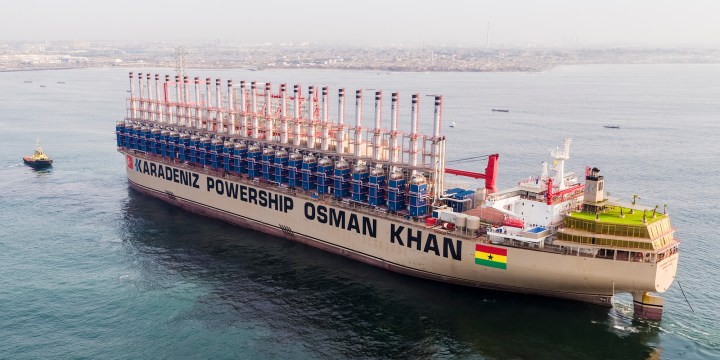BUSINESS REFLECTION
After the Bell: Karpowership’s ‘biodiversity offsets’ will make the greens see red

Karpowership is seemingly trying to bolster its biodiversity credentials by purchasing a private game farm, which it will donate to Ezemvelo KZN Wildlife. But that’s not the only concern about this troubling transaction.
The Turkish company Karpowership has sought to clinch environmental approval for one of its three planned ship-mounted, gas-powered plants in South African waters – in this case, the one planned for Richards Bay – by purchasing a private game farm, which it will donate to Ezemvelo KZN Wildlife.
“The Port of Richards Bay presents a unique circumstance where the active industrial port, used largely for coal exports, operates within an estuarine bay. Biodiversity offsetting is a form of impact mitigation,” Bloomberg quoted the company as saying.
A subsequent amaBhungane report has revealed that the farm in question is the 1,750-hectare Madaka Game Ranch, a popular destination for North American hunters, which borders the Ithala Game Reserve, a provincial park populated with rhino and elephant. It lies 200km inland from Richards Bay.
AmaBhungane notes that the “biodiversity offsets” proposed are known as “ecological compensation”, since comparing an inland ecosystem with an estuarine one is like comparing apples and oranges.
But that’s not the only concern about this troubling transaction.
Ezemvelo KZN Wildlife is, to put it mildly, a withered husk of what was once a great and pioneering government wildlife department. Transferring private conservation land in KZN to the provincial government will almost certainly bode ill for wildlife, further diluting the supposed benefits of the “ecological compensation”.
Most of the parks and reserves in KZN are falling apart in the face of mismanagement and corruption.
Testimony to this state of affairs can be seen in the decay of Hluhluwe-iMfolozi Park, the province’s flagship Big Five reserve which provided the seed population for the rest of South Africa’s white rhinos in an early example of what is now called “rewilding”.
Human/wildlife conflict has surged around the reserve as unmaintained fences have fallen into disrepair. Poaching levels are also very high. In the first six months of 2023, at least 231 rhinos were killed in South Africa, a decline of 11% compared with the first half of last year.
Over the same period this year, 46 were killed in privately owned reserves, which is about 20%. Yet privately held rhinos now account for about 60% of the national herd, while 80% of the poaching incidents have taken place in state-run parks that hold 40% of the population.
The private sector is simply doing a better job of rhino protection and conservation.
And it is KZN’s shabbily run provincial reserves which have become the epicentre of the carnage, accounting for more than 60% of the rhinos poached in the first half of 2023.
It’s not just rhinos. All species pretty much fare better on private game farms and reserves than their counterparts in state-run parks, notably in KZN, where incursions by livestock and people have become common.
Any claims that this will result in a “biodiversity offset” are clearly suspect.
I’ve been a semi-regular visitor to northern KZN for more than 25 years, and initially saw huge and positive changes for local rural communities there, in part because the ANC was rolling out paved roads and power and water provision, one presumes partly in a bid to undermine the rival IFP.
Still, the Lubombo Spatial Development Initiative and the establishment of the iSimangaliso Wetland Park were in the early days conservation and social success stories, preserving wildlife while bringing the basic amenities of the 20th century to previously deprived rural populations. Access to water removed the stark terror of fetching it from rivers menaced by hippos and crocs.
When I used to drive to Sodwana Bay for a weekend of diving and fishing, the main road through iSimangaliso was brimming with wildlife instead of livestock. You would once see giraffes and zebras, now only cattle and goats.
The nearby Mkuze Game Reserve once teemed with elephants and rhino. When I drove through there with my wife in December last year, the only evidence of such wildlife was their aged scat.
Of course, the roads are falling into a state of disrepair, while the flicker of hope that came with rural electrification has been dimmed by crippling power cuts.
This brings us back to Karpowership, which is going to do nothing material to address South Africa’s power crisis but is going to cost a proverbial arm and a leg.
The initial 20-year contract has been estimated by the CSIR to cost R228-billion – the details have been kept suspiciously concealed – for about 1,220MW of power supplied by five floating power ships plugged in at the ports of Richards Bay, Coega and Saldanha Bay.
It has since offered to slash the duration of the contract to five years for around R15-billion a year. But that would require a fresh procurement process to allow other bidders to revise their offers.
That bottom line is that it has never seemed like a good deal, and while nothing has been proven, it has carried the stench of corruption ever since Karpowership won about 60% of a government tender in March 2021 to supply 2,000MW as the power crunch was worsening.
The merits of the deal – which has been subjected to numerous court challenges and regulatory hurdles – look even worse against the backdrop of the roughly 4,000MW of renewable energy that private businesses and households have installed, at no cost to the government. Indeed, this has helped to generate economic activity and revenue for a government that is rather cash-strapped at the moment.
KZN Wildlife is also not exactly flush with cash at the moment and hardly has the capacity to manage a new reserve.
The prospect of this transaction creating “biodiversity offsets” is simply pie in the sky. DM




















Comments - Please login in order to comment.